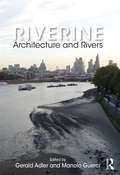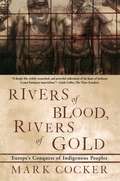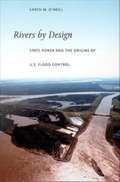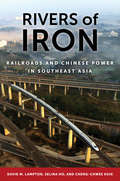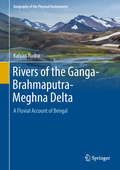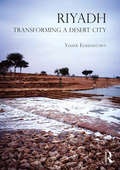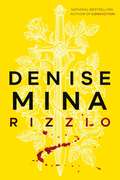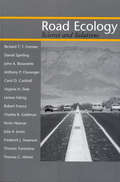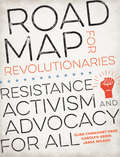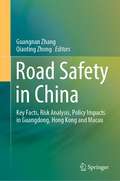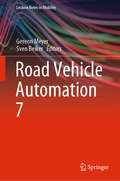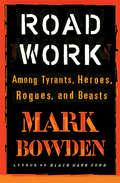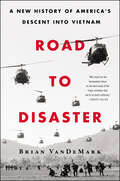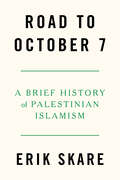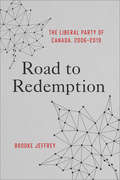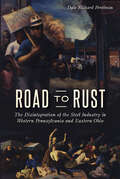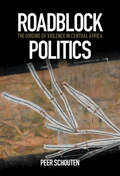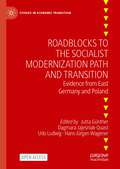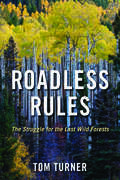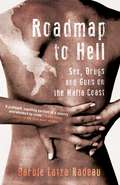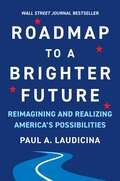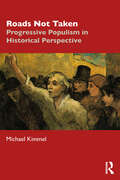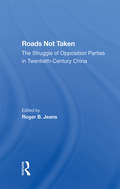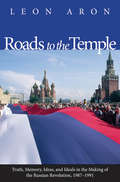- Table View
- List View
Riverine: Architecture and Rivers
by Gerald Adler Manolo GuerciRiverscapes are the main arteries of the world’s largest cities, and have, for millennia, been the lifeblood of the urban communities that have developed around them. These human settlements – given life through the space of the local waterscape – soon developed into ritualised spaces that sought to harness the dynamism of the watercourse and create the local architectural landscape. Theorised via a sophisticated understanding of history, space, culture, and ecology, this collection of wonderful and deliberately wide-ranging case studies, from Early Modern Italy to the contemporary Bengal Delta, investigates the culture of human interaction with rivers and the nature of urban topography. Riverine explores the ways in which architecture and urban planning have imbued cultural landscapes with ritual and structural meaning.
Rivers Of Blood, Rivers of Gold: Europe's Conquest of Indigenous Peoples
by Mark CockerThe past five centuries have witnessed a shocking series of confrontations between European nations and millions of indigenous peoples, and these cultural encounters still resonate strongly to this day. Rivers of Blood, Rivers of Gold is an essential book for understanding the true impact of imperialism. Beautifully and passionately written, it provides a judicious and exhaustively researched indictment of European exploitation. Focusing on four collisions between Europeans and indigenous cultures--the conquest of Mexico, the British onslaught on the Tasmanian Aborigines, the uprooting of the Apaches, and the German campaign against the tribes of Southwest Africa--Mark Cocker illuminates the fundamental experiences that underlay the colonial experience around the globe. Beyond making a persuasive--and balanced--case against colonialism, Cocker also sustains a riveting, often harrowing story. Rivers of Blood, Rivers of Gold is narrative history in its most impressive form--engaging, accessible, and thought provoking.
Rivers by Design: State Power and the Origins of U.S. Flood Control
by Karen M. O'NeillThe United States has one of the largest and costliest flood control systems in the world, even though only a small proportion of its land lies in floodplains. Rivers by Design traces the emergence of the mammoth U. S. flood management system, which is overseen by the federal government but implemented in conjunction with state governments and local contractors and levee districts. Karen M. O'Neill analyzes the social origins of the flood control program, showing how the system initially developed as a response to the demands of farmers and the business elite in outlying territories. The configuration of the current system continues to reflect decisions made in the nineteenth century and early twentieth. It favors economic development at the expense of environmental concerns. O'Neill focuses on the creation of flood control programs along the lower Mississippi River and the Sacramento River, the first two rivers to receive federal flood control aid. She describes how, in the early to mid-nineteenth century, planters, shippers, and merchants from both regions campaigned for federal assistance with flood control efforts. She explains how the federal government was slowly and reluctantly drawn into water management to the extent that, over time, nearly every river in the United States was reengineered. Her narrative culminates in the passage of the national Flood Control Act of 1936, which empowered the Army Corps of Engineers to build projects for all navigable rivers in conjunction with local authorities, effectively ending nationwide, comprehensive planning for the protection of water resources.
Rivers of Iron: Railroads and Chinese Power in Southeast Asia
by David M. Lampton Selina Ho Cheng-Chwee KuikIn 2013, Chinese President Xi Jinping unveiled what would come to be known as the Belt and Road Initiative (BRI)—a global development strategy involving infrastructure projects and associated financing throughout the world, including Asia, Africa, the Middle East, Europe, and the Americas. While the Chinese government has framed the plan as one promoting transnational connectivity, critics and security experts see it as part of a larger strategy to achieve global dominance. Rivers of Iron examines one aspect of President Xi Jinping’s "New Era": China’s effort to create an intercountry railway system connecting China and its seven Southeast Asian neighbors (Cambodia, Laos, Malaysia, Myanmar, Singapore, Thailand, and Vietnam). This book illuminates the political strengths and weaknesses of the plan, as well as the capacity of the impacted countries to resist, shape, and even take advantage of China’s wide-reaching actions. Using frameworks from the fields of international relations and comparative politics, the authors of Rivers of Iron seek to explain how domestic politics in these eight Asian nations shaped their varying external responses and behaviors. How does China wield power using infrastructure? Do smaller states have agency? How should we understand the role of infrastructure in broader development? Does industrial policy work? And crucially, how should competing global powers respond?
Rivers of the Ganga-Brahmaputra-Meghna Delta: A Fluvial Account Of Bengal (Geography of the Physical Environment)
by Kalyan RudraThis is the first comprehensive book on the rivers of the Ganga-Brahmaputra-Meghna delta. This volume covers all aspects of this highly populated region including land conflicts and environmental impacts such as the Indo-Bangladesh conflict over sharing of trans-boundary water. This book addresses the topic from a highly interdisciplinary perspective covering areas of geography, geology, environment, history, archaeology, sociology and politics of the Bengal region.The book appeals to a wide range of audiences from India, Bangladesh and the international community. The style of presentation makes it easily suitable for students, researchers and interested laymen.
Riyadh: Transforming a Desert City (Planning, History and Environment Series)
by Yasser ElsheshtawyRiyadh has set its sights on becoming a world city befitting the twenty-first century. To that end it has embarked on a massive construction drive evidenced in the proliferation of proposals for high-end districts, giga-developments and elaborate infrastructures. An urban vision seemingly dedicated to attracting global capital. Yet such a narrative can be misleading. A ‘humanization programme’, initiated during the tenure of its former mayor Abdulaziz bin Ayyaf, has complemented the city’s rapid rise by providing spaces catering for the everyday needs of its inhabitants. Yasser Elsheshtawy, in this richly illustrated book, targets these people-centred settings. It is a compelling counter-narrative interweaving critical theoretical insights, personal observations, and serendipitous encounters. He deftly demonstrates how Riyadh thrives through the actions of its people. As the world moves towards an urban model that is resilient and humane, the humanizing efforts of an Arab city are worthy of our attention. Riyadh’s premise is perhaps best captured in the cover image depicting the desert riverbed of Wadi Sulai, filled with rainwater, making its way towards the Saudi capital. Along its banks there will be dedicated public pathways and urban parks. It is a vision of an urbanity where both the spectacular and the everyday coexist. A city that is not just dedicated to the few, but one that serves the many.
Rizzio: A Novella
by Denise MinaFrom the multi-award-winning master of crime, Denise Mina delivers a radical new take on one of the darkest episodes in Scottish history—the bloody assassination of David Rizzo private secretary to Mary, Queen of Scots, in the queen&’s chambers in Holyrood Palace.On the evening of March 9th, 1566, David Rizzio, the private secretary of Mary, Queen of Scots, was brutally murdered. Dragged from the chamber of the heavily pregnant Mary, Rizzio was stabbed fifty six times by a party of assassins. This breathtakingly tense novella dramatises the events that led up to that night, telling the infamous story as it has never been told before. A dark tale of sex, secrets and lies, Rizzio looks at a shocking historical murder through a modern lens—and explores the lengths that men and women will go to in their search for love and power. Rizzio is nothing less than a provocative and thrilling new literary masterpiece.
Road Ecology: Science and Solutions
by Virginia H. Dale Daniel Sperling Anthony P. Clevenger Richard T.T. Forman Carol D. Cutshall John A. BissonetteA central goal of transportation is the delivery of safe and efficient services with minimal environmental impact. In practice, though, human mobility has flourished while nature has suffered. Awareness of the environmental impacts of roads is increasing, yet information remains scarce for those interested in studying, understanding, or minimizing the ecological effects of roads and vehicles. Road Ecology addresses that shortcoming by elevating previously localized and fragmented knowledge into a broad and inclusive framework for understanding and developing solutions. The book brings together fourteen leading ecologists and transportation experts to articulate state-of-the-science road ecology principles, and presents specific examples that demonstrate the application of those principles. Diverse theories, concepts, and models in the new field of road ecology are integrated to establish a coherent framework for transportation policy, planning, and projects. Topics examined include: *foundations of road ecology *roads, vehicles, and transportation planning *vegetation and roadsides *wildlife populations and mitigation *water, sediment, and chemical flows *aquatic ecosystems *wind, noise, and atmospheric effects *road networks and landscape fragmentationRoad Ecology links ecological theories and concepts with transportation planning, engineering, and travel behavior. With more than 100 illustrations and examples from around the world, it is an indispensable and pioneering work for anyone involved with transportation, including practitioners and planners in state and province transportation departments, federal agencies, and nongovernmental organizations. The book also opens up an important new research frontier for ecologists.
Road Map for Revolutionaries: Resistance, Activism, and Advocacy for All
by Carolyn Gerin Elisa Camahort Page Jamia WilsonA handbook for effective activism, advocacy, and social justice for people of all ages and backgrounds. Are you ready to take action and make your voice heard, but don't know how to go about it? This hands-on, hit-the-ground-running guide delivers lessons on practical tactics for navigating and protecting one's personal democracy in a gridlocked, heavily surveilled, and politically volatile country. If you want to start making a difference but don’t know what to do next, Road Map for Revolutionaries provides the resources needed to help you feel safer, more empowered, invested in, and intrinsic to the American experiment. The book addresses timely topics such as staying safe at protests, supporting marginalized communities, online privacy, and how to keep up the fight for the long term, breaking down key issues and outlining action steps for local, state, and federal levels of government. Visit roadmapforrevolutionaries.com.
Road Safety in China: Key Facts, Risk Analysis, Policy Impacts in Guangdong, Hong Kong and Macau
by Guangnan Zhang Qiaoting ZhongThis book presents comprehensive research and analyses on road traffic safety in China, discussing individual, vehicle, road and environmental factors to improve road safety in the country. It also sheds light on the development of similar (adjusted) measures to reduce traffic violations and/or accident fatalities and injuries, and to promote road safety in other countries and regions. As such, it is a valuable resource for anyone wanting to understand the characteristics and patterns of road traffic safety, the risk factors affecting traffic violations and traffic injuries, as well as road safety policies and practices in China.
Road Vehicle Automation 7 (Lecture Notes in Mobility)
by Gereon Meyer Sven BeikerThis book is the seventh volume of a sub-series on Road Vehicle Automation, published as part of the Lecture Notes in Mobility. Written by researchers, engineers and analysts from around the globe, the contributions are based on oral and poster presentations from the Automated Vehicles Symposium (AVS) 2019, held on July 15–18, 2019, in Orlando, Florida, USA. The book explores public sector activities, human factors aspects, vehicle systems and other related technological developments, as well as transportation infrastructure planning, which are expect to foster and support road vehicle automation.
Road Work: Among Tyrants, Heroes, Rogues, and Beasts
by Mark Bowden“Painstakingly reported stories about losers, oddballs and con men” from the #1 New York Times–bestselling journalist (The New York Times Book Review). From the author of Black Hawk Down comes a riveting collection of the most diverse and far-reaching of Mark Bowden’s award-winning nonfiction—“with fascinating features on Norman Mailer, the war against terror, and even a Philadelphia Zoo gorilla, Bowden’s range is broad” (Entertainment Weekly). Whether traveling to Rhode Island where one of the largest cocaine rings in history is uncovered, or to the Luangwa Valley in Zambia where anti-poachers fight to save the black rhino, Bowden takes us down rough roads previously off-limits: the top-secret world of Guantanamo Bay; Saddam Hussein’s post 9/11 days on the run; a pimp’s inside track on police corruption in Philadelphia; and Al Sharpton’s campaign trail. Bowden also invites readers along to meet a small-town high school football team, farmers who make bras for cows, the Rocky Balboa statue in Philadelphia, and on an inspiring trip to Disney World with a wide-eyed group of terminally ill children. In Road Work, Mark Bowden “fashion[s] prose that reads like good fiction, with the bonus that his stories are true” (The New York Times Book Review). “Astute character reading and solid research combine with ingenious and stylish prose: a superior portfolio from a journalist who stays at the top of his game.” —Kirkus Reviews, starred review “Bowden is unlike any other journalist . . . Superb reporting, a fine mind conceiving the story line, and a compelling writing style lead to something approaching immortality.” —St. Louis Post-Dispatch
Road to Disaster: A New History of America's Descent into Vietnam
by Brian VanDeMark“This book is sure to appeal to those still searching for Vietnam War answers that even McNamara, Johnson, and their best and brightest advisers never found.” —Publishers Weekly (starred review)Many books have been written on the tragic decisions regarding Vietnam made by the young stars of the Kennedy and Johnson administrations. Yet despite millions of words of analysis and reflection, no historian has been able to explain why such decent, brilliant, and previously successful men stumbled so badly.That changes with Road to Disaster. Historian Brian VanDeMark draws upon decades of archival research, his own interviews with many of those involved, and a wealth of previously unheard recordings by Robert McNamara and Clark Clifford, who served as Defense Secretaries for Kennedy and Johnson. Yet beyond that, Road to Disaster is also the first history of the war to look at the cataclysmic decisions of those in the Kennedy and Johnson administrations through the prism of recent research in cognitive science, psychology, and organizational theory to explain why the “Best and the Brightest” became trapped in situations that suffocated creative thinking and willingness to dissent, why they found change so hard, and why they were so blind to their own errors.An epic history of America’s march to quagmire, Road to Disaster is a landmark in scholarship and a book of immense importance.“The most thoughtful and judicious one-volume history of the war and the American political leaders who presided over the difficult and painful decisions that shaped this history. The book will stand for the foreseeable future as the best study of the tragic mistakes that led to so much suffering.” —Robert Dallek, #1 New York Times-bestselling author
Road to October 7: A Brief History of Palestinian Islamism
by Erik SkareHow Islamism became a leading force in the Palestinian resistanceIn Road to October 7, Erik Skare argues that Palestinian Islamism is far more complex and dynamic than generally assumed. The phenomenon has continuously developed through disputes between moderates and hardliners. These struggles have largely been settled by external drivers – intra-Palestinian competition, Israeli violence and repression, or shifts in the regional power balance.
Road to Redemption: The Liberal Party of Canada 2006-2019
by Brooke JeffreyDespite being described as the most successful political party in any western democracy, the Liberal Party of Canada experienced its worst electoral defeat in 2011. Reduced to third-party status, the Liberal Party of Canada was seen by some experts as a spent force doomed to disappear from the Canadian political scene. And yet, just four years later, the party surged ahead once more, winning one of the most decisive elections in Canadian history. Road to Redemption offers a detailed exploration of this stunning reversal. It begins by outlining weaknesses in the party’s organization and culture, weaknesses that existed long before the 2011 rout but were ignored while the party continued to win elections. Finally brought to light by the disastrous 2011 electoral campaign, these weaknesses were then systematically tackled by party elites and activists in a concerted effort to rebuild and restructure the party. Their efforts culminated in the state-of-the-art campaigns run by Justin Trudeau’s Liberals in 2015 and 2019. Brooke Jeffrey argues that the remarkable turnaround of 2015 confirms the Liberal Party’s exceptional ability to redefine itself and adapt to changing circumstances, a singular strength and the principal reason for the party’s enduring appeal. Despite being reduced to a minority government in 2019, Jeffrey concludes that the Liberal Party and leader Justin Trudeau can take advantage of this second chance to further strengthen and consolidate the party’s position for years to come.
Road to Rust: The Disintegration of the Steel Industry in Western Pennsylvania and Eastern Ohio
by Dale Richard PerelmanThe author of Steel tells the story of strikes and violent unrest amid the mines and mills of twentieth-century Pennsylvania and Ohio—includes photos. As the twentieth century dawned on western Pennsylvania and eastern Ohio, the region&’s steel industry faced a struggle for unionism. The industry was plagued by disasters that killed and maimed countless workers, many of them impoverished immigrants from Ireland, Hungary, and other nations—in 1906 alone, more than four hundred workers died in steel plant accidents. In response, unionists like Philip Murray, John L. Lewis, Samuel Gompers, and Gus Hall began to battle for fair wages, hours, and working conditions. Managers like Judge Elbert Gary and Tom Girdler opposed their every move. Tensions from issues of immigration, class, skill, and race erupted throughout the industry. The tribulations led to widespread steel strikes directed by the Amalgamated Association of Iron and Steel Workers and the Steel Workers Organizing Committee, and a war that killed scores and injured thousands. In this book, industrial relations expert Dale Richard Perelman charts the struggle and decline of the nation&’s most prominent regional steel industry.
Roadblock Politics: The Origins of Violence in Central Africa
by Peer SchoutenThere are so many roadblocks in Central Africa that it is hard to find a road that does not have one. Based on research in the Democratic Republic of Congo (DRC) and the Central African Republic (CAR), Peer Schouten maps more than a thousand of these roadblocks to show how communities, rebels and state security forces forge resistance and power out of control over these narrow points of passage. Schouten reveals the connections between these roadblocks in Central Africa and global supply chains, tracking the flow of multinational corporations and UN agencies alike through them, to show how they encapsulate a form of power, which thrives under conditions of supply chain capitalism. In doing so, he develops a new lens through which to understand what drives state formation and conflict in the region, offering a radical alternative to explanations that foreground control over minerals, territory or population as key drivers of Central Africa's violent history.
Roadblocks to the Socialist Modernization Path and Transition: Evidence from East Germany and Poland (Studies in Economic Transition)
by Udo Ludwig Hans-Jürgen Wagener Jutta Günther Dagmara Jajeśniak-QuastThis open access book examines how different economic systems impacted the development of East Germany and Poland. Through comparing these countries while they were centrally planned socialist economies with the periods when they transitioned to capitalism, the inability of socialist economies to modernize effectively and produce sustained economic growth is highlighted. Particular attention is given the role of technological progress in economic growth, peculiar institutions, the creation and transfer of knowledge, and post-socialist transformations. The book presents a detailed analysis of the barriers to modernization and growth implied by Soviet-type state socialism and the differences and similarities between the transition of East Germany and Poland to capitalist market economies. It will be relevant to students and researchers interested in comparative systems and the political economy.
Roadless Rules: The Struggle for the Last Wild Forests
by Tom TurnerRoadless Rules is a fast-paced and insightful look at one of the most important, wide-ranging, and controversial efforts to protect public forests ever undertaken in the United States. In January 2000, President Clinton submitted to the Federal Register the Roadless Area Conservation Rule, prohibiting road construction and timberharvesting in designated roadless areas. Set to take effect sixty days after Clinton left office, the rule was immediately challenged by nine lawsuits from states, counties, off-road-vehicle users, and timber companies. The Bush administration refused to defend the rule and eventually sought to replace it with a rule that invited governors to suggest management policies for forests in their states. That rule was attacked by four states and twenty environmental groups and declared illegal. Roadless Rules offers a fascinating overview of the creation of the Clinton roadless rule and the Bush administration's subsequent replacement rule, the controversy generated, the response of the environmental community, and the legal battles that continue to rage more than seven years later. It explores the value of roadless areas and why the Clinton rule was so important to environmentalists, describes the stakeholder groups involved, and takes readers into courtrooms across the country to hear critical arguments. Author Tom Turner considers the lessons learned from the controversy, arguing that the episode represents an excellent example of how the system can work when all elements of the environmental movement work together--local groups and individuals determined to save favorite places, national organizations that represent local interests but also concern themselves with national policies, members of the executive branch who try to serve the public interest but need support from outside, and national organizations that use the legal system to support progress achieved through legislation or executive action.
Roadmap for Humanities and Social Sciences in STEM Higher Education
by Sayantan MandalThis edited book focuses on the interconnections of STEM and Humanities and Social Sciences (HSS) in higher education and offers novel approaches to reintegrating them. It paradoxically informs readers of how HSS got relegated to the periphery in the capitalist-driven higher education market and the pressing need to re-organise higher education to meet the demands of competencies in the same education industry. The contributors, including eminent scholars from academia and industry, decision-makers, and researchers, bring nuanced perspectives on integrating HSS into STEM through the global north and south lens. The book is divided into seven parts providing a comprehensive understanding of the critical position of STEM, its interaction with HSS, some exemplars to elucidate holistic education, the importance of HSS in industry, and the roadmap facilitating the organic integration across disciplines. It provides an in-depth analysis of the difficulties HSS faces in science and technical higher education and offers creative solutions to these difficulties, a plausible roadmap for teachers and educational planners wishing to incorporate HSS into STEM higher education. The book stresses the importance of integrating the social sciences and humanities to foster innovation and success in STEM education. It is a must-read for those dedicated to integrating and advancing HSS in STEM higher education, such as educational policymakers, institutional leaders, higher education managers, and educational policy and management researchers.
Roadmap to Hell: Sex, Drugs and Guns on the Mafia Coast
by Barbie Latza NadeauFrom sex slaves to drug mules, The Daily Beast's Rome Bureau Chief uncovers a terrifying and intricate web of criminal activity right on Europe&’s doorstep. Chasing the money from kidnapped Nigerian hair braiders to ISIS gunrunners, this is the story of modern slavery in Europe and how the plight of those most in need is being wilfully disregarded. Caught between Camorra arms dealers and Nigerian drug gangs along Italy&’s attractive coast, each year thousands of refugees and migrants are lured into their murky underworld. In this powerful exposé, investigative journalist Barbie Latza Nadeau follows the weapons trail, meets the sex-trafficked women trapped by black magic, the nuns who try to save them and the Italian police who turn a blind eye as the most urgent issues facing Europe play out in broad daylight.
Roadmap to a Brighter Future: Reimagining and Realizing America's Possibilities
by Paul A. LaudicinaA Wall Street Journal and Publishers Weekly bestseller America's best days should still lie ahead. Here&’s the realistic and definitive path to get us there. The future doesn&’t just happen. It&’s a choice that we can and must help determine. But as our deeply divided nation reels from converging crises and seemingly intractable discord, where do we begin when the stakes are unfathomably high? With multiple possible futures before us, Americans need to understand the specific consequences of our immediate choices, seize the opportunity to renew the nation's promise, and set the stage to benefit current and future generations. If we chart our course correctly, we can emerge from our current troubles with a brighter future in reach of all Americans. Based on decades of expertise in envisioning and articulating policy options, Paul Laudicina lays out four vastly different visions for America's future. In Roadmap to a Brighter Future, he outlines why the best version of America will only come about if the correct actions are taken now—and outlines the ten steps needed to decisively tackle our most pervasive problems and address critical priorities. Laudicina, who led one of the world's most-respected management consultancies and has worked as a longtime senior advisor to Joe Biden, also integrates the uncensored views and fresh ideas of dozens of the world's leading thinkers, CEOs, scientists, government leaders, and innovators, to show why optimism about the United States is not only warranted, but crucial.
Roads Not Taken: Progressive Populism in Historical Perspective
by Michael KimmelUsing a range of in-depth historical case studies, this timely work excavates the oft-forgotten tradition of progressive populism and highlights the relevance of such movements to our own tumultuous times.Populism in its 21st-century guise is often centered around exclusionary notions of nationality and the exultation of an authoritarian leader. Yet, as this book demonstrates, this has not always been the case. As demonstrated by the Levellers in the English Civil War and the Sans-Culottes in the French Revolution, the ideas of progressive populism have often surfaced in the midst of revolution where they have sought to ensure that revolutions do not deviate from their lofty ideals. Progressive populism has also emerged during periods of crisis and social dislocation, reasserting conceptions of the “moral economy” and a romanticized view of the past in support of their goals. By looking at the trajectories of past iterations of these ideas, Michael Kimmel retrieves a different populism, based not upon the illusory entity of “the people,” but something more concrete: the capacity of real people, living their lives with a sense of both autonomy and community.This book will be of interest to students and scholars in disciplines including sociology, history, and political science.
Roads Not Taken: The Struggle Of Opposition Parties In Twentieth-century China
by Edward S Krebs Roger Jeans Parks Coble Marilyn M. LevineStudies of the political history of twentieth-century China traditionally have been skewed toward a two-dimensional view of the major combatants: the Chinese Communist Party and the Guomindang. Although their struggle undeniably has been the main story, it is neither the only nor the complete story. During the Republican period (1912-1949), many ed
Roads To The Temple
by Leon AronLeon Aron considers the “mystery of the Soviet collapse” and finds answers in the intellectual and moral self-scrutiny of glasnost that brought about a profound shift in values. Reviewing the entire output of the key glasnost outlets in 1987-1991, he elucidates and documents key themes in this national soul-searching and the “ultimate” questions that sparked moral awakening of a great nation: “Who are we? How do we live honorably? What is a dignified relationship between man and state? How do we atone for the moral breakdown of Stalinism?” Contributing both to the theory of revolutions and history of ideas, Aron presents a thorough and original narrative about new ideas’ dissemination through the various media of the former Soviet Union. Aron shows how, reaching every corner of the nation, these ideas destroyed the moral foundation of the Soviet state, de-legitimized it and made its collapse inevitable.
